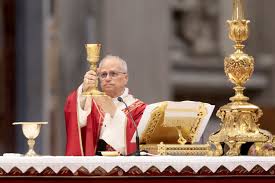The Church of England has made history by appointing Sarah Mullally as the first-ever female Archbishop of Canterbury, breaking a 1,400-year tradition.
Mullally, 63, who previously worked as a cancer nurse and later as England’s Chief Nursing Officer, will now serve as the spiritual leader of over 85 million Anglicans worldwide.
She succeeds Justin Welby, who resigned following criticism over a child abuse cover-up scandal.
While her appointment has been welcomed in Britain as a major step toward gender equality in the Church, it has also drawn sharp criticism from conservative Anglican churches, especially in Africa.
Leaders in Rwanda and Nigeria said women should not hold such positions, warning that her leadership could deepen divisions within the global Anglican Communion.
Mullally has been Bishop of London since 2018 and is known for supporting same-sex blessings and pushing for reforms to address safeguarding failures and sexual abuse scandals within the Church.
She has also spoken strongly against antisemitism, condemning the deadly attack on a Manchester synagogue just a day before her appointment was announced.
Speaking at Canterbury Cathedral, Mullally said she wanted to build unity in the Church and help “every ministry flourish.”
She acknowledged that debates over same-sex relationships and the role of women in leadership may not be resolved quickly but stressed the need for compassion and inclusivity.
Her background in nursing, she said, taught her the importance of care, empathy, and standing with people during their hardest times.
She is also a firm opponent of assisted dying, calling it unsafe and a threat to vulnerable people.
The appointment was confirmed by Prime Minister Keir Starmer’s office and formally approved by King Charles III, the Supreme Governor of the Church of England.
Reforms passed a decade ago made it legally possible for a woman to take the role of Archbishop of Canterbury, one of Britain’s oldest and most symbolic religious offices.
Religious scholars believe Mullally’s management skills, emphasis on unity, and personal compassion could help the Church through one of its most divided periods.
As one Canterbury resident said, “Some archbishops have been good, some have been controversial, and some have even been killed. I hope she will be one of the good ones. This is truly historic.”



